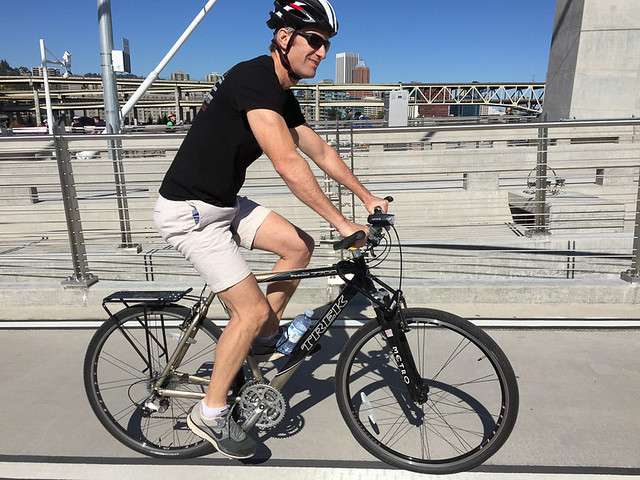
(Photo: J.Maus/BikePortland
Portland’s next mayor is a Multnomah County commissioner turned state treasurer who embraced protected bike lanes and more neighborhood greenway traffic diverters from almost the start of his run for office.
Ted Wheeler was drawing 58 percent of Portland’s primary vote Tuesday night, easily defeating opponents Jules Bailey and Sarah Iannarone, among others.
Wheeler also set himself apart on transportation issues by endorsing a local gas tax to improve Portland streets on the day he announced his campaign — a position that rapidly became conventional wisdom among local politicians and won a narrow victory Tuesday night.
“Portland is unique,” Wheeler said in his victory speech. “Portland’s on the move. Portland’s best years are still ahead of it.”
Bailey drew 16 percent of the vote, Iannarone 10 percent. Bruce Broussard, who didn’t make it to any candidates’ forum we saw but distinguished himself on transportation issues by speaking out against a redesign of Foster Road intended to improve safety by replacing two passing lanes with a center turn lane and bike lanes, was in fourth place with 4 percent, followed (in descending order) by Sean Davis, David Schor and Patty Burkett.
Novick will head to runoff in November
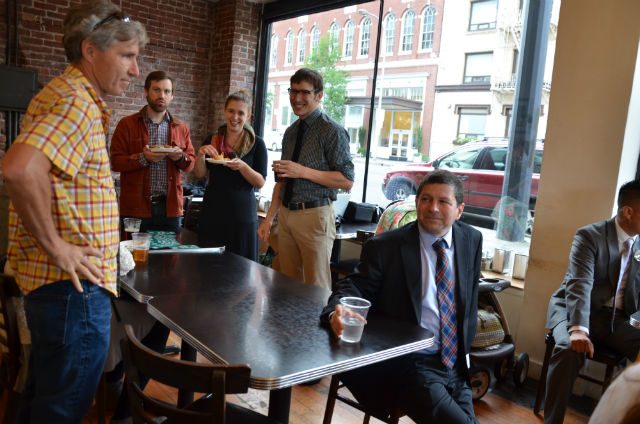
(Photo: M.Andersen/BikePortland)
The gas tax package, which included promised biking and walking improvements in every quadrant of the city as well as pavement repairs for various crumbling streets, was up by 4,268 votes as of 12:30 a.m. Wednesday, enough for 51.6 percent of the vote and enough for The Oregonian to call the race.
With 43 percent of the vote in his race, Portland Transportation Commissioner Steve Novick looks to be headed to a runoff with either architect Stuart Emmons or bookseller Chloe Eudaly. Emmons was slightly ahead of Eudaly Tuesday night, with 15 percent of the vote to her 13 percent.
Novick has been a solidly pro-biking vote on the Portland City Council, though he’s never made it one of his signature issues. He’s also established himself as probably the most vocal progressive on parking policy, speaking in favor of demand-based pricing, and on housing infill, which he has called essential to affordability in the city.
Emmons and Eudaly haven’t gone out of their way to stake out positions on bicycling, though Emmons did send us a photo of himself biking the Eastbank Esplanade a few months ago. On his website, his only stated position on transportation is that “our streets need attention.” Eudaly has made housing affordability, especially for tenants, her signature issue. Whichever of them comes out ahead, expect more coverage of this race in the coming months.
“It looks to me like I’m probably going to a runoff in November against the Oregonian editorial board, which is fine,” Novick told attendees of his election-night party. The newspaper’s editorial board has been a particular foe of Novick’s, endorsing Emmons and being the only local significant media outlet to oppose the gas tax he championed.
Wheeler win could start to reshape City Hall this year
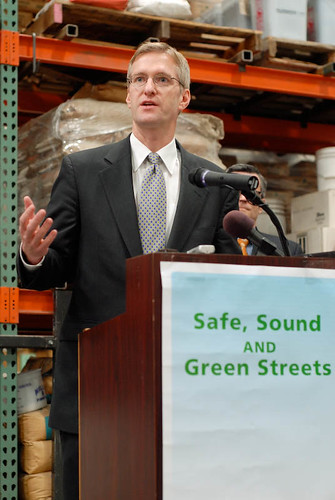
2008 event calling for new local transportation funding.
(Photos: J.Maus/BikePortland)
Wheeler’s election is likely to immediately reduce Mayor Charlie Hales’ influence on the city council as commissioners maneuver for good relationships with Wheeler. In Portland’s unusual system of government, the mayor’s only significant power over his other commissioners is the ability to assign them administrative power over the city’s various bureaus.
Last year, Wheeler reportedly told an Oregonian columnist that he wanted to take the city’s transportation bureau for himself. In a March interview with BikePortland, he described that as an “offhand comment” and that he wouldn’t make any such commitements.
Also at stake: the city council is approaching a series of crucial votes on its comprehensive plan this summer. The plan, which shapes the city’s zoning maps, pits advocates of infill and housing supply against people who oppose changes to Portland’s physical appearance.
Here’s how we summarized our 45-minute conversation with Wheeler last March:
• Like his opponents, he supports expansion of protected bike lanes and neighborhood greenways. Though he backs the gas tax ballot issue, he thinks it won’t raise enough for those projects to make the investments he thinks are needed.
• Though the Portland Business Alliance, the regional chamber of commerce, announced its endorsement of Wheeler the day we spoke, Wheeler said he’s never discussed transportation policy with them. He said he does not agree with the notion (sometimes expressed by the PBA) that auto capacity should not be reduced on major arterials.
• He stepped back from a previously reported statement that as mayor he would take the transportation bureau; he said that was an “offhand conversation” and he’s made no decisions.
• His plan for transportation funding is to pass a gas tax in the short run, then get the 2017 state legislature to allocate more state and federal road taxes to cities like Portland. In the long run, he doesn’t think the city should let any of its pavement degrade, and thinks the city needs incremental steps to improve its credibility among voters.
• His first priority for all transportation investments is safety improvements east of 82nd Avenue. He doesn’t think all new transportation investment should happen there but he thinks East Portland should get the large majority to make up for decades of underinvestment.
• Though he supports increasing housing density by re-legalizing duplexes and garden apartments in residential zones, he thinks there’s some validity to the argument that new tall buildings can make nearby housing more expensive. He doesn’t see a tradeoff between “historic preservation,” which he values, and keeping housing affordable.
• Unlike his opponent Jules Bailey, Wheeler sees “training” as inadequate to addressing apparent racial profiling of people biking and walking by officers in the Portland Police Bureau. Deeper cultural change in the bureau is necessary, he said.
Other races
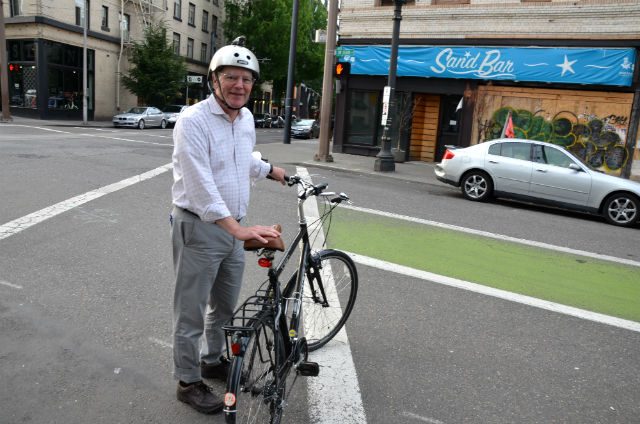
Also Tuesday, Commissioner Amanda Fritz and incumbent Gov. Kate Brown won in anticipated landslides, Fritz with 70 percent of the city vote. Jessica Vega Pederson, who had a pro-biking record as state legislator, was elected to the Multnomah County Commission in an uncontested race in southeast Portland. Karin Power, who won a seat on Milwaukie’s city council two years ago on a pro-biking platform and has helped lead that city’s recent political embrace of biking, won an uncontested Democratic primary in the 41st legislative district.
Brown, a Democrat, will face Bud Pierce, a Republican legislator who has promised to “end gridlock once and for all” by adding lanes to every “major freeway.”
Metro Councilor Bob Stacey, a longtime bike commuter who is maybe the single most pro-bike politician in the region, was elected to a second four-year term to represent southeast Portland in the regional government. His colleague Sam Chase, who represents inner northeast, north and northwest Portland and took the lead on Metro’s recent work to approve mountain-biking trails on public land north of Forest Park, coasted to reelection with 77 percent against Colby Clipston.
In Bailey’s county commissioner district in inner southeast and west Portland, Sharon Meieran and Eric Zimmerman are headed to a runoff. The same is true for Lori Stegmann and Amanda Schroeder in Gresham and east county. (Expect BikePortland coverage of these county races, which will shape the future of the Burnside Bridge and Sauvie Island, in the months to come.)
Gas tax work could start in fall
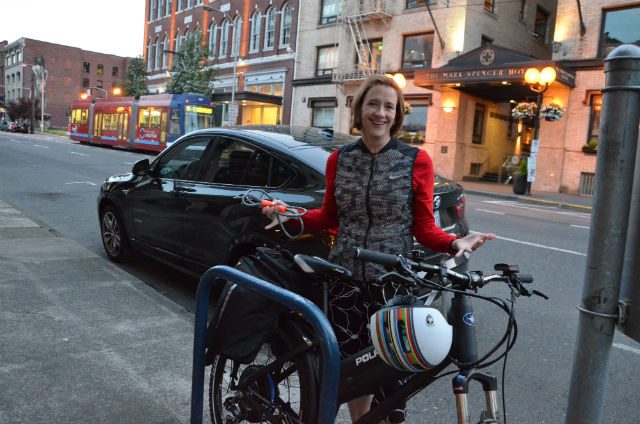
The four-year, 10-cent-per-gallon gas tax will raise an estimated $16 million for each of the next four years, of which 44 percent would be earmarked for safety improvements to local streets — mostly improvements for walking and biking.
Among other things — including various sidewalk and crosswalk upgrades around the city — the project list includes new funding for protected bike lanes in downtown Portland; two neighborhood greenways connecting much of East Portland to the Gateway Transit Center; a neighborhood greenway on NE 7th and/or 9th Avenue in inner northeast Portland; a neighborhood greenway on NW/SW 20th Avenue connecting the Northwest District to Goose Hollow; and $2 million a year for biking and walking improvements near schools, which would be chosen in partnership with local school districts.
In an interview Tuesday night, Portland Transportation Director Leah Treat said that gas tax money will start to arrive in “late fall.” The city will then be able to start paving selected streets and to start planning the first round of safety improvements.
“We’re ready to get to work,” Treat said.
Correction 10 am: A previous version of this post got Ted Wheeler’s current job wrong. He’s the state treasurer. We regret the error; it was a long night.
— Michael Andersen, (503) 333-7824 – michael@bikeportland.org
Our work is supported by subscribers. Please become one today.
